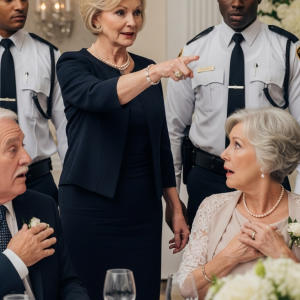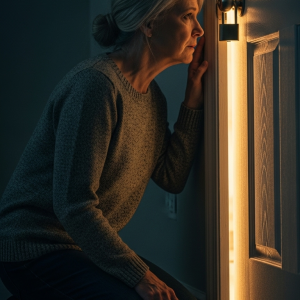Sienna Taylor’s life was a gilded cage, and the day she was ousted as CEO of Carrington Green, the bars finally broke. Stripped of her corporate identity and the empire her father built, she traded her skyscraper view for an open road, seeking solitude in the vast, unforgiving landscape of Colorado. But a simple flat tire on a deserted highway wouldn’t just strand her; it would ignite a chain reaction that shattered her carefully constructed world and rebuilt it with a boy she never saw coming.
The moment her silver Porsche lurched, the tires shredding against the asphalt, Sienna’s perfectly curated life screeched to a halt. There was no cell signal, no passing cars, just the oppressive heat of the desert and a crushing sense of isolation. The spare tire sat uselessly in the trunk—a symbol of her helplessness. This was more than a flat tire; it was a physical manifestation of her life: all the tools, all the resources, and yet she was paralyzed, incapable of fixing the most basic problem.
Just as panic began to set in, he appeared like a mirage from a cloud of dust. A young man, barely out of his teens, with a casual confidence that seemed entirely out of place in this desolation. He wore the desert on his skin and in the lines of his plain clothes. “Need some help?” he called out, his voice calm, direct, and entirely devoid of the pity she’d grown accustomed to. For the first time, Sienna felt seen, not as a former CEO, but as a person in need.
He introduced himself as Jaylen Brooks, and as he worked on her car, his hands moved with an effortless grace that spoke of a deep, innate knowledge. He was a natural artisan, and the tools in his hands were an extension of his will. He shared a simple truth: his uncle had taught him everything, not for profit, but “so I could help people.” That single line struck Sienna harder than any corporate report. It was a philosophy she had forgotten, a purpose she had abandoned in the pursuit of wealth and power.
When the new tire was on, Sienna reached for her wallet, a reflex born of a lifetime of transactional relationships. She wanted to pay him, to make sense of this exchange in the only way she knew how. But Jaylen just smiled, a disarming, honest smile that reached his eyes. “Nobody helped me when I was starting out,” he said. “I’ll manage just fine.” He walked away, a ghost of an impression in the swirling dust, leaving Sienna with a question that echoed in the silence: what was the true cost of kindness, and what had she been missing her whole life?
Back at her family’s sprawling estate, surrounded by a luxury that now felt hollow, Jaylen’s quiet strength haunted her thoughts. The polished floors and expensive artwork felt like a museum of a life she no longer recognized. The boy with dirt on his hands had more integrity than any of the men who had orchestrated her downfall. She couldn’t shake the image of his self-assured hands, the honest look in his eyes, the casual way he had saved her without fanfare. She found herself driving back to that lonely highway, not for a destination, but for a person.
She found him just as before, working with his hands, this time mending a neighbor’s railing. When she approached, Jaylen’s surprise was replaced with a quiet warmth. “Sienna,” he said, her name sounding different, more real, on his lips. As they sat on the porch, a world of difference between them, she found herself confessing the truth: the loss of her power, the emptiness that followed. She spoke not to a stranger, but to a confidant. The old Sienna would never have revealed this vulnerability. The new one was still finding her voice, and it was Jaylen who was listening.
“I want you to help me build something,” she said, the words a leap of faith. She proposed a community workshop, a place where people could learn real, tangible skills. The shock on his face was palpable. “You barely know me,” he replied, a mix of caution and disbelief in his voice. “I know what you did out there on the highway,” she countered. “You helped me when I had nowhere else to turn. That tells me everything I need to know.” That was all he needed. He agreed, a silent promise to join her on this new, uncertain path.
Their collaboration was a strange, beautiful fusion of two worlds. Sienna, the corporate strategist, brought the business acumen and funding. Jaylen, the mechanic, brought the soul—the knowledge, the grit, and the unyielding belief in hard work. They met not in boardrooms, but in a dusty, run-down warehouse. She in simple jeans, he in his work clothes, both finding a common language in hammers and hydraulic lifts. They were building more than a workshop; they were building a bridge between their lives.
But the world they were trying to escape soon found them. When Sienna brought Jaylen to a fundraiser at her family’s estate, the contrast was stark and immediate. The whispers and judgmental stares from her former colleagues and the elite were like a physical force. Jaylen, a man so comfortable in his own skin, looked out of place, an object of curiosity. She followed him into the garden, the silence of the night a stark contrast to the cacophony of the ballroom. “I’m sorry,” she said, the apology a confession of her mistake. “I shouldn’t have brought you here.”
“I know you meant well,” he replied, but the sadness in his smile was a silent reproach. “I’m just not used to being stared at.” Sienna’s heart ached for him. She knew that look—the feeling of being judged and dismissed. “You have every right to be here,” she insisted, her voice trembling with conviction. “You’re the only person who’s treated me like an equal in a long time,” he confessed, and in that moment, their bond transcended partnership. It was built on a foundation of mutual respect and shared vulnerability.
When the workshop finally opened its doors, a new kind of drama began to unfold. Reporters, former colleagues, and the public saw a headline: “Millionaire CEO saves underprivileged youth.” They didn’t see the truth. They didn’t see the long nights, the arguments over design, the shared victories of securing a donation. They didn’t see a rescue—they saw a story, a narrative that fit their preconceptions. Jaylen, however, was unfazed. “I’ve always been underestimated,” he told her. “It doesn’t frighten me. It fuels me.”

The real climax came at the Denver Tech Conference. Sienna was scheduled to speak, and everyone expected a return to form—a discussion of profits and market shares. Instead, she took the stage with Jaylen. She didn’t speak of business models; she spoke of humanity. “I lost my position because I believed in investments that benefited society,” she began. “I almost lost sight of why I got into this business… until someone reminded me what true value looks like.”
She turned to Jaylen, her voice strong and clear. “Jaylen Brooks is a nineteen-year-old mechanic from Grand Junction. He doesn’t own a single share of Carrington Green, but he owns my respect.” And then, in front of a sea of suits and screens, she spoke a truth that had been growing in her heart since that day on the highway. “I love him.” The silence that followed was deafening, but Sienna stood firm. She had just traded a boardroom for a life built on her own terms, and the look of pride on Jaylen’s face was worth more than a thousand stock options.
The fallout was swift, but the love and support that followed were a testament to the power of their story. Letters poured in from people who had felt unheard and unseen, who saw in their story a glimmer of hope. Within a year, the Brooks & Taylor Institute was a reality. It was a place of learning, not of charity. Jaylen taught with the same quiet authority he had shown on the highway, and Sienna managed the logistics, their partnership now a seamless dance.
At the grand opening, Jaylen spoke not of his poverty, but of his purpose. “I used to think some people were born to stay small,” he said, his voice ringing with a quiet power. “Then someone powerful sat beside me on a hot highway, and listened to me. She didn’t try to fix me or pity me. She believed in me. She handed me tools, not charity.” The applause was thunderous, not for a rich woman’s good deed, but for two people who had found dignity and purpose together.
As the sun set, Jaylen and Sienna stood together in the new courtyard, their hands intertwined. “I didn’t lose power when I left the boardroom,” she said, her voice soft. “I just found a better way to use it.” He smiled, and together they looked out at the stars, a pair of unlikely partners bound not by wealth or status, but by a shared purpose and a love that had bloomed in the most unexpected of places. It was a love built not on rescue, but on respect, a love that proved some stories are meant to be rewritten, and that the best ones are a collaboration.
A week after the grand opening, I sat in my office at the Brooks & Taylor Institute, watching Jaylen work with a group of students on an old engine. He wasn’t just teaching them how to tighten bolts or connect wires; he was teaching them about patience, about self-respect, and about finding joy in the work of their hands. Jaylen told me about a boy named Lucas, who used to be insecure about not doing well in school. He found confidence in repairing a motorcycle, learning that intelligence isn’t only found in books.
Stories like this came to me every day. A single mother learned how to do electrical work and was now confident enough to open her own small shop. An unemployed man found a new job after completing a welding course. Our institute wasn’t just a vocational center; it had become a place of transformation, where people who once felt left behind could find a new path. The change wasn’t just happening on the outside; it was happening within me as well. I used to think my worth was measured by my assets, my power, and my reputation. Jaylen showed me that true value lies in giving back, in making a positive difference.
One evening, Jaylen came into my office, holding a paper cup of coffee. He sat down, looking at me with eyes full of emotion. “I talked to my mom,” Jaylen said. “She’s so proud of us and the Institute.” I smiled, my heart filled with warmth. Jaylen’s mother, a strong and loving woman, had once worried about her son’s future. Now, she saw her son not just succeeding, but also helping so many others.
“We did something extraordinary, Sienna,” Jaylen said, his voice deep and warm. “We turned a crazy idea into a reality.” He leaned forward, his gaze locking with mine. “I used to feel like I was just a speck of dust in this vast desert. But you… you made me feel like I could build mountains.” My breath caught in my throat. I had believed I was the one who had given him a chance, but I was wrong. He had given me a reason to get up in the morning, a purpose that was bigger than any corporate title.
Our relationship deepened with every shared success and every quiet moment of reflection. We spent our evenings not at lavish parties, but at a local diner, talking about the day’s events, the students’ progress, and our dreams for the future. He introduced me to his friends, people who worked with their hands and their hearts, and who saw the world with a clarity I had never known. I introduced him to my parents, who, after an initial period of polite surprise, had come to admire his quiet dignity and strength. My father, the same man who had once seen me as a pawn in a boardroom game, saw the genuine happiness I had found, and he finally understood.
The old world tried to pull me back, of course. A few months later, a prominent venture capitalist, a former colleague of my father’s, called me with an offer. “Sienna, we’ve been watching your work at this… community center,” he said, the condescension thick in his voice. “It’s a great feel-good story, and the PR is incredible. We want to bring you back to Carrington Green. We’ll give you a board seat, a generous salary, and a chance to get back in the game.”
I listened, but the words felt hollow. The game he spoke of was a cold, unforgiving one, built on profit margins and a ruthless pursuit of power. “Thank you for the offer,” I said, my voice steady. “But I’ve already found a better game to play.” I hung up the phone, a sense of relief washing over me. I had finally severed the last tie to a life that had never truly fulfilled me.
The Brooks & Taylor Institute continued to grow. We expanded our offerings to include classes in computer programming, graphic design, and even a small business incubator. Jaylen, with his innate ability to connect with people, became the heart and soul of the place. He was not just a teacher; he was a mentor, a confidant, a leader. I, in turn, found a new kind of power in fundraising, in networking, in using my connections to bring resources to a community that desperately needed them. We were a team, a perfect balance of grit and grace, of heart and head.
One late afternoon, we were standing on the roof of the warehouse, looking out at the sun setting over the Rockies. The sky was a canvas of fiery oranges and purples, a sight that always humbled me. “Remember that day on the highway?” I said, leaning my head on his shoulder. “I was so lost. I had everything and nothing all at once.”
Jaylen wrapped his arm around me. “I remember,” he said softly. “I saw a beautiful woman in a broken car, and all I could think was that I had to help her. I didn’t know then that I was helping myself, too.”
“You taught me that power isn’t about control,” I said. “It’s about empowering others. You taught me that value isn’t about what you own, but what you build. And you taught me that love can be found in the most unexpected places.” He kissed my forehead, a simple, honest gesture that meant more to me than a thousand diamond rings.
We stood there for a long time, watching the first stars appear, two people who had come from different worlds and had built a new one together. We were no longer defined by our pasts—the ousted CEO and the young mechanic. We were simply Sienna and Jaylen, partners in life, in love, and in a shared purpose that had given our lives meaning beyond measure. The road ahead was long, but we would walk it together, hand in hand, building a future not just for ourselves, but for all the people who were ready to learn, to grow, and to find their own way home.




